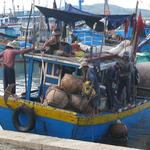Pathways for Urban Food Security in the Pacific: Situating the Urban Informal Food Sector in the Context of Urbanisation and Globalisation
The urban context is often sidelined in the academic discourse surrounding food security in the Pacific. Yet, for some Pacific nations, cities are the home for most of their citizens. In this thematic literature review, we direct our attention toward the increasingly important topic of food security in Pacific cities. We investigate how the urban informal food sector historically has provided a baseline of food security in Pacific cities. The production, livelihood, and exchange practices that define the urban informal food sector can be traced back to the forms of urbanisation and migration that occurred in the post-independence era in the Pacific. However, we also identify how urban formalisation and globalisation are undermining the key tenets of social relationality that the informal food sector relies upon. As such, the forms of food security provided by the urban informal food sector are being slowly eroded. By identifying these disruptions to the informal urban food sector, we identify pragmatic pathways to develop the basis of a conceptual framework for urban food security in the Pacific. These pathways revolve around invigorating the forms of social relationality within the informal food sector's production, livelihood, and exchange practices.
https://doi.org/10.25120/jre.2.1.2022.3918
Roxane de Waegh
Greg Watt



